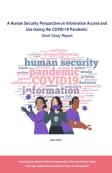A Human Security Perspective on Information Access and Use During the COVID-19 Pandemic: Short Study Report

The novel coronavirus (COVID-19) outbreak highlighted multiple human insecurities in 2020 and continues to do so. The virus has spread rapidly between and within countries and became a global threat, further aggravating existing social and economic challenges. In addition, the uncertainty and unpredictability of this infectious disease has contributed to heightened fear and anxiety among communities, leading to a greater level of vulnerability and insecurity. Across all these constraints and challenges, the need to access reliable information and stay informed about the pandemic are crucial human security issues that everyone must address.
This report details the results of an online survey conducted and distributed in four prefectures in Japan in 2020. Its main objective is to gain a glimpse of people's information-seeking behavior during the COVID-19 pandemic by presenting the intersection between crisis information seeking and human security. The study utilizes a human security perspective in analyzing people's information seeking during crises and emergencies, highlighting that (a) information sources are critical tools in making informed decisions during a crisis, (b) information-seeking needs and access are influenced by diverse factors such as socio-demographic characteristics, and (c) access to crisis-related information can influence the level of risk perception.
This qualitative study of combined literature review and emerging studies related to human security, risk information, and COVID-19 affirms that information is an essential resource during a crisis. Its forms, its presence or absence, and its quality contribute to people's security in confronting the crisis. More so, access to risk information is an essential element in ensuring human security. Information from protection actors provides and makes available the answers to people's varied concerns. Likewise, the information people receive and access empowers them to make informed decisions, including following safety protocols and helping in further consideration of COVID-19 vaccination.
Keywords: COVID-19 pandemic, human security, crisis information seeking, risk information, risk communication
scroll